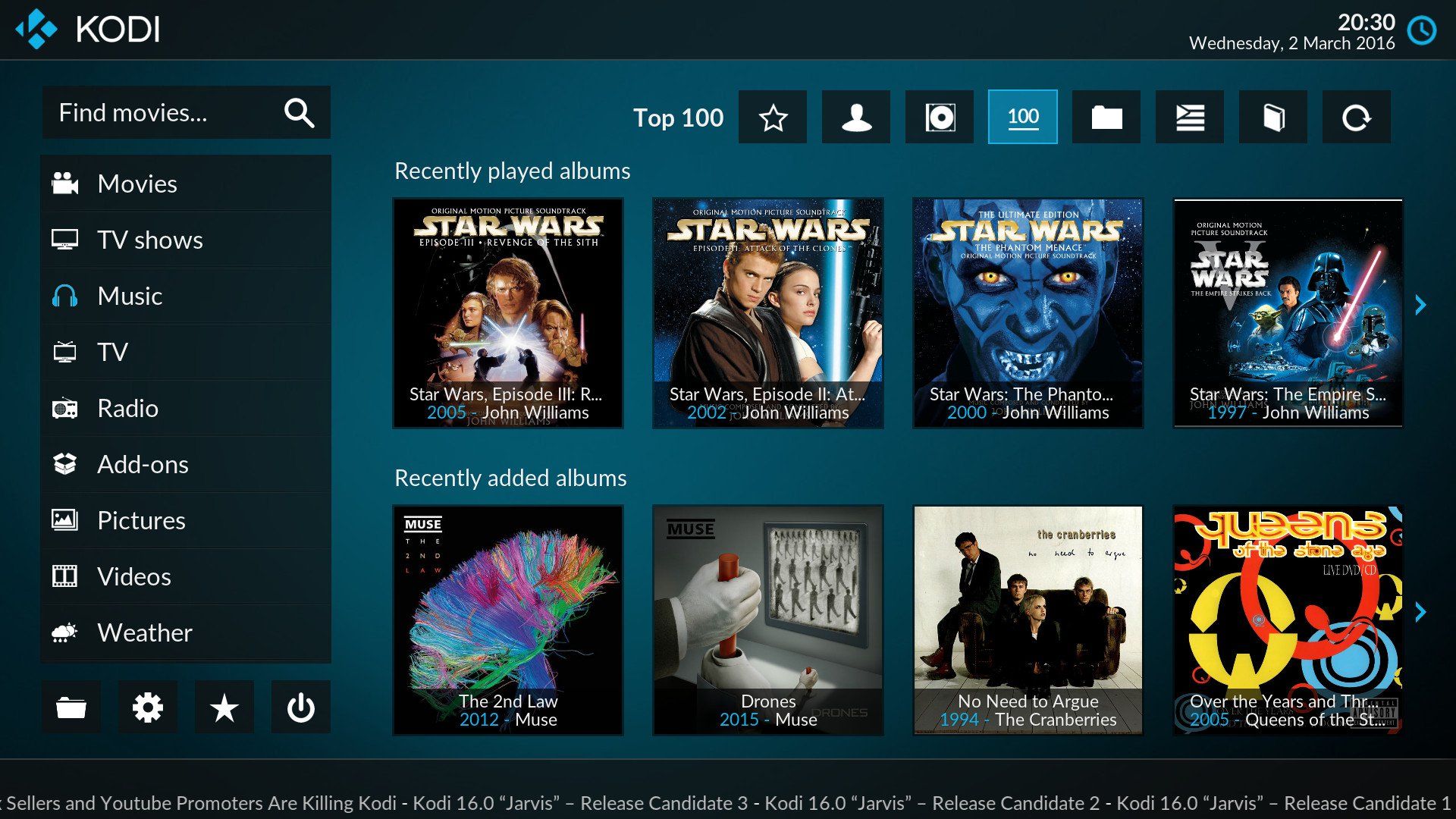latest

Kodi 19.1 arrives with official Xbox support and a ton of bug fixes
It hasn't brought back any missing add-ons, though
It's been a few months since Kodi 19 was released to the public, its first significant update in over two years. Codenamed "Matrix," the app presented users with a switch away from Python 2 support for add-ons. That shift has left many popular extensions unsupported, with some fans even delaying upgrading to the new version. If you've made the plunge into Kodi 19, a major patch is out today that should help alleviate any lingering software issues you've found.

Kodi 19 now available with improved decoding, UI tweaks, and substantial changes to add-ons
Not everyone is happy with the update
Kodi, formerly XBMC, is one of the most popular media center applications ever. It combines many media sources into one easy-to-navigate interface, with support for several operating systems (including Android). Over two years since the last release, Kodi 19 is now rolling out, but not everyone is happy with the upgrade.

How to rip your movie collection to watch anywhere
Stuck in quarantine? Now's a great time to digitize those DVD and Blu-Ray discs
Physical media has its time and its place, but in the era of ultra-fast home Wi-Fi and high-res smartphones and tablets, a Blu-Ray or DVD basically makes no sense for a lot of the ways we now consume content. While ripping your collection of discs to digital can be time-consuming and comes with a real cost (disk space), going through the trouble can get you something Netflix can't: permanent, go-anywhere access to your complete media collection that no one can take away.In this guide, we'll show you how to get started ripping your DVDs and Blu-Rays, stripping the DRM protection, and converting them into more space-friendly and watchable formats for all of your devices. As a bonus, we'll show you how to get a media server up and running so you can stream those movies from any device, anywhere.

Read update
- Although the block was real, turns out it was done accidentally. Sony's Android TV builds on affected devices were blocking the package ID because they were detecting them as kernel objects at install. Sony plans on rolling out a fix that will allow Kodi to be installed again in its next update.
Kodi (formerly XBMC) has attracted an undeservedly bad rap outside media streaming circles, garnering a piracy-associated reputation that isn't quite merited — at least, in my opinion. Whatever you might believe, it looks like Sony might be taking a critical view of the project, too, as reports indicate that at least some of the company's recent Android TVs are actively blocking the app.

Users of open-source media player Kodi (formerly XMBC) have been waiting for release 18 (codenamed "Leia") for almost two years. Now, after what the project itself describes as a "long gestation," Kodi 18 is available for all supported platforms. It has a massive list of changes, including Android Leanback suggestions, and support for retro gaming emulators.

Around half a week ago we reported that Sony appeared to be blocking the installation of Kodi — the occasionally maligned media-streaming platform — on some of its recent Android TVs. While there is an effective block in place, we're told by Sony that it was an accident, and the next software update for affected platforms will deliver a fix.

April Fools' day is almost upon us, but each year at least a few companies are unable to restrain themselves, pushing out their pranks early as the remainder dribble out over the day itself. Google's various divisions do some decent work each year—last year's Google Gnome was itpretty good, and the Maps team's 2014 Pokemon prank was memorable. OnePlus even has a history of pulling off a decent prank. But, there are a ton of individual companies and gags to follow.

What's worse than a security vulnerability in a widely-used program? A security vulnerability in several widely-used programs. Researchers from Check Point Software Technologies have uncovered a flaw in a handful of media players (including VLC, Kodi, Stremio, and PopcornTime) that allows hackers to run executable code through subtitle files.

Kodi, formerly known as XBMC, is an open-source media player that is available on a variety of platforms - including Android. If you use Kodi on your Android TV, you'll be happy to know that the next major release will support Leanback suggestions and voice search.

Read update
Kodi, perhaps better known by its former name XBMC, is one of the most popular media centers around. It's open source, cross-platform, and is endlessly extendable - what's not to love? Now Kodi 17, codenamed 'Krypton,' is live on the Play Store with thousands of new features and bug fixes.

Kodi version 17 is bringing a new look to the app that turns your Android device into a media center. Some of you may still recall the open source project by its old name, XBMC. Either way, the upcoming release has reached beta status. That makes now a good time to dive in if you can't wait to get what's coming next.

Kodi is a popular name in media streaming circles, not least because it can run on pretty much anything. Last year, an Android app was released, which has gone to achieve over five million downloads. However, that's where it may stay, at least for the time being. In the last few days, the sole developer of the app, Chris Browet, a.k.a. Koying, has quit working on Kodi and resumed development on his forked version, Semper Media Center, or SPMC for short.

Looking to turn your Android device into a media center? If you plan on streaming everything over the Internet, there's Plex. If not, there's Kodi, the open source project formerly known as XBMC.

Kodi (formerly XBMC) is a popular option for those who want to roll their own media center, and the official Kodi remote "Kore" plugs into the system perfectly. This app hit the Play Store earlier this year, shortly after the alpha and beta builds of Kodi did, and now Kore is getting a nice v2.0 update.

Bugs happen. As a result, bugfix updates also happen. Kodi 15.2 is the second such release since version 15.0 of the app formerly known as XBMC went stable, and it tackles quite a list of issues. Head's up—all of them are very specific.

Kodi, also known as the app formerly known as XBMC, has made it to version 15. This evolution comes a little over half a year since the last major release. We're graced with a number of new features, a big one being 4K support on Android devices with capable hardware and a version of Lollipop. Refreshrate switching and HEVC playback are also available on such gadgets.

June didn't see any huge releases in terms of Android apps, though we did finally get a publicly-available version of the Kodi Media Center, and Photoshop for Android (yes, yet another version of Photoshop). There are also some new tools for cloud storage fans, and probably the best cooking app on the Play Store. We've got some notable extras (especially if you're a Stephen Colbert fan). Here in no particular order are the best seven new apps from June, along with some honorable mentions.

OK, Amazon, I can sympathize with your plight. As both the legal operator of a massive software distribution service and a TV, movie, and music vendor beholden to various rights holders, you might be tempted to remove anything from your app store that even whiffs of piracy or copyright infringement. Hell, I could help you spot some examples if you want. But that really doesn't excuse booting legitimate, useful apps off of your store without a second thought, as appears to be the case with Kodi Media Center.AFTV reports that Amazon removed Kodi, a highly technical open-source media manager (formerly called XBMC), from the Amazon Appstore last week. The developers were given no warning or explanation. When they contacted Amazon directly, they were told that, "[Amazon] determined that it can be used to facilitate the piracy or illegal download of content," and asked not to resubmit the app again.

Kodi, formerly XBMC, has been available on Android in its revamped form since early April. But if you wanted to get your hands on it, you had to join either the alpha or beta groups on Google+, then register on the Play Store as a tester. Not so today: it looks like the developers have opened up the beta Play Store listing for one and all, and you can download it directly to your phone, tablet, or Android TV set-top box.

You may have caught the news earlier today about the alpha and beta versions of Kodi (formerly XMBC) finally reaching the Play Store. Well, as a nice accessory to that, there's the official remote app now too. This listing actually showed up a few weeks ago, but has gone mostly unnoticed, which is why you are reading these words. Kore lets you control the action on Kodi, and it looks rather nice.







